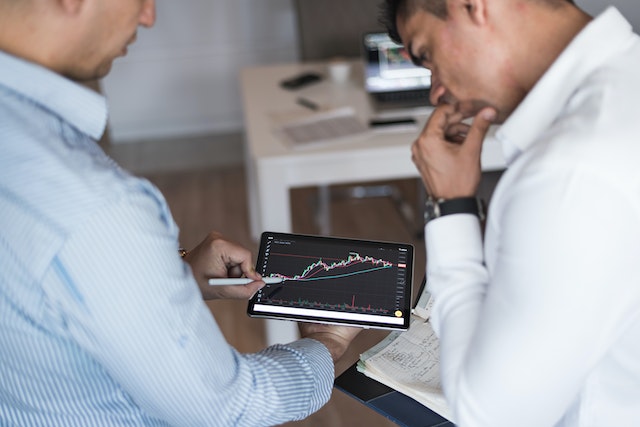What is Online Trading ?
The act of purchasing and selling financial products over the Internet is known as online trading. The trader uses an online trading platform to buy and sell. Bonds, stocks (shares), futures, international currencies, and other financial instruments can all be traded online.
The majority of people trade online using an online broker. A brokerage firm that provides its services over the Internet is known as an online broker. Unlike traditional brokers, the investor does not meet with the broker in person or over the phone. Everything takes place on the internet. 'online' refers to 'on the Internet.'
Brokerage firms provide online trading platforms to anyone interested in trading financial securities.
"Online trading is basically the act of buying and selling financial products through an online trading platform,".
E-Commerce, which stands for Electronic Commerce, includes online trading.
Traditional trading vs. online trading
Previously, investors would contact their broker to have them execute a trade on their behalf. They had the option of visiting or calling their broker. In reality, there was no other option.
For example, in the 1970s, if I wanted to buy 100 IBM shares, I would contact my broker. I'd then make an order request. The broker would inform me of the current share price of IBM and confirm the purchase order.
Previously, the entire procedure was relatively lengthy. The broker would confirm how long the order should be kept open, which account to withdraw funds from, and so on.
It is now a do-it-yourself world, thanks to online trading. Online traders, in other words, can buy and sell financial securities on their own. In fact, they can perform multiple trades without the assistance of others.
Most importantly, the modern online trader can perform all of these tasks quickly. In fact, it happened almost instantly.
Greater control over online trading
The traditional trader has far less control over trades than the online trader. They can execute trades much faster than they could face-to-face or over the phone.
Aside from being able to manage multiple positions at the same time, the online trader has access to a wealth of data. Online brokers and other websites provide in-depth information about companies, exchanges, and markets.
The Internet has given many people access to the world of investing. Individuals from all socioeconomic backgrounds can now execute trades, not just the wealthy.
Tracy Wilson writes that many "ordinary" people now own stock. Online trading has enabled anyone with a computer and some spare cash to invest in the market.
Ms. Wilson stated:
"You don't need a personal broker or a large sum of money to do it, and most analysts agree that ordinary people trading stocks is no longer a sign of impending doom."
"The market has become more accessible, but you should not take online trading lightly."
New Online Trading
The invention of the Internet has brought about many changes in the way that we conduct our lives and our personal businesses. We can pay our bills online, shop online, bank online, and even date online!
We can even buy and sell stocks online. Traders love having the ability to look at their accounts whenever they want to, and brokers like having the ability to take orders over the Internet, as opposed to the telephone.
Most brokers and brokerage houses now offer online trading to their clients. Another great thing about trading online is that fees and commissions are often lower. While online trading is great, there are some drawbacks.
If you are new to investing, having the ability to actually speak with a broker can be quite beneficial. If you aren’t stock market savvy, online trading may be a dangerous thing for you. If this is the case, make sure that you learn as much as you can about trading stocks before you start trading online.
You should also be aware that you don’t have a computer with Internet access attached to you. You won’t always have the ability to get online to make a trade. You need to be sure that you can call and speak with a broker if this is the case, using the online broker. This is true whether you are an advanced trader or a beginner.
It is also a good idea to go with an online brokerage company that has been around for a while. You won’t find one that has been in business for fifty years, of course, but you can find a company that has been in business that long and now offers online trading.
Again, online trading is a beautiful thing - but it isn’t for everyone. Think carefully before you decide to do your trading online, and make sure that you really know what you are doing!
Video - Online Tradiing
What to consider when choosing a broker
Stockbrokers are required to pass two different tests in order to obtain their license. These tests are very difficult, and most brokers have a background in business or finance, with a bachelor's or master's degree.
It is very important to understand the difference between a broker and a stock market analyst. An analyst literally analyzes the stock market and predicts what it will or will not do, or how specific stocks will perform. A stock broker is only there to follow your instructions to either buy or sell stock - not to analyze stocks.
Brokers earn their money from commissions on sales in most cases. When you instruct your broker to buy or sell a stock, they earn a set percentage of the transaction. Many brokers charge a flat "per transaction" fee.
There are two types of brokers: full-service brokers and discount brokers. Full-service brokers can usually offer more types of investments, may provide you with investment advice, and are usually paid in commissions.
Discount brokers typically do not offer any advice or do any research – they just do as you ask them to do, without all of the bells and whistles.
So, the biggest decision you must make when it comes to brokers is whether you want a full-service broker or a discount broker.
If you are new to investing, you may need to go with a full-service broker to ensure that you are making wise investments. They can offer you the skills that you lack at this point. However, if you are already knowledgeable about the stock market, all you really need is a discount broker to make your trades for you.
To Determine Your Risk Tolerance
Each individual has a risk tolerance that should not be ignored. Any good stock broker or financial planner knows this, and they should make the effort to help you determine what your risk tolerance is. Then, they should work with you to find investments that do not exceed your risk tolerance.
Determining one’s risk tolerance involves several different things. First, you need to know how much money you have to invest and what your investment and financial goals are.
For instance, if you plan to retire in ten years, and you’ve not saved a single penny towards that end, you need to have a high risk tolerance because you will need to do some aggressive (risky) investing in order to reach your financial goal.
On the other hand, if you are in your early twenties and you want to start investing for your retirement, your risk tolerance will be low. You can afford to watch your money grow slowly over time.
Realize, of course, that your need for a high risk tolerance or your need for a low risk tolerance really has no bearing on how you feel about risk. Again, there is a lot in determining your tolerance.
For instance, if you invested in the stock market and you watched the movement of that stock daily and saw that it was dropping slightly, what would you do?
Would you sell out or would you let your money ride? If you have a low tolerance for risk, you would want to sell out... If you have a high tolerance, you will let your money ride and see what happens. This is not based on what your financial goals are. This tolerance is based on how you feel about your money!
Again, a good financial planner or stock broker should help you determine the level of risk that you are comfortable with, and help you choose your investments accordingly.
Your risk tolerance should be based on what your financial goals are and how you feel about the possibility of losing your money. It’s all tied in together.
Choosing Where You Will Invest
Of course, determining where you will invest begins with researching the various available types of investments, determining your risk tolerance, and determining your investment style—along with your financial goals.
If you were going to purchase a new car, you would do quite a bit of research before making a final decision and purchase. You would never consider purchasing a car that you had not fully looked over and taken for a test drive. Investing works much the same way.
You will, of course, learn as much about the investment as possible, and you will want to see how past investors have done as well. It’s common sense!
Learning about the stock market and investing takes a lot of time... but it is time well spent. There are numerous books and websites on the topic, and you can even take college-level courses on the topic – which is what stock brokers do. With access to the Internet, you can actually play the stock market – with fake money – to get a feel for how it works.
You can make pretend investments and see how they do. Do a search with any search engine for ‘Stock Market Games’ or ‘Stock Market Simulations.’ This is a great way to start learning about investing in the stock market.
Other types of investments - outside of the stock market - do not have simulators. You must learn about those types of investments the hard way - by reading.
As a potential investor, you should read anything you can get your hands on about investing.... but start with the basic investment books and websites first. Otherwise, you will quickly find that you are lost.
Finally, speak with a financial planner. Tell them your goals and solicit their advice - this is what they do!A good financial planner can easily help you determine where to invest your funds and help you set up a plan to achieve all of your financial goals. Many will even teach you about investing along the way- make sure you pay attention to what they are telling you!






Post a Comment for " About Online Trading "Definition and meaning""